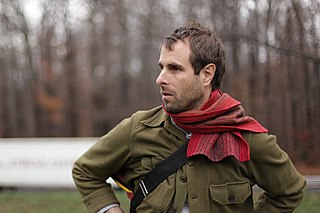A Quote by Joan Didion
We tell ourselves stories in order to live. We live entirely by the impression of a narrative line upon disparate images, the shifting phantasmagoria, which is our actual experience.
Related Quotes
We tell ourselves stories in order to live...We look for the sermon in the suicide, for the social or moral lesson in the murder of five. We interpret what we see, select the most workable of the multiple choices. We live entirely, especially if we are writers, by the imposition of a narrative line upon disparate images, by the "ideas" with which we have learned to freeze the shifting phantasmagoria which is our actual experience.
The Nigerian storyteller Ben Okri says that ‘In a fractured age, when cynicism is god, here is a possible heresy: we live by stories, we also live in them. One way or another we are living the stories planted in us early or along the way, or we are also living the stories we planted — knowingly or unknowingly — in ourselves. We live stories that either give our lives meaning or negate it with meaninglessness. If we change the stories we live by, quite possibly we change our lives.’
The media we surround ourselves with allows us to manufacture our own experience every day, which is a perception of the world that is our own invention entirely, whether it is on social media or what we choose to absorb. This was very different when I was a kid, like generations before us we were exposed to things that were not entirely on our terms. We had to wrestle with and find the relationship with the world around you. It was literal experience, unlike the form of protracted psychic masturbation that is the digital world we live in.
To read fiction means to play a game by which we give sense to the immensity of things that happened, are happening, or will happen in the actual world. By reading narrative, we escape the anxiety that attacks us when we try to say something true about the world. This is the consoling function of narrative — the reason people tell stories, and have told stories from the beginning of time.
In order to find God in ourselves, we must stop looking at ourselves, stop checking and verifying ourselves in the mirror of our own futility, and be content to be in Him and to do whatever He wills, according to our limitations, judging our acts not in the light of our own illusions, but in the light of His reality which is all around us in the things and people we live with.
In order to settle down in the quiet of our own being we must learn to be detached from the results of our own activity. We must be content to live without watching ourselves live, to work with expecting immediate reward, to love without an instant satisfaction, and to exist without any special recognition. It is only when we are detached from ourselves that we can be at peace with ourselves.
The vicarious responsibility for things we have not done, this taking upon ourselves the consequences for things we are entirely innocent of, is the price we pay for the fact that we live our lives not by ourselves but among our fellow men, and that the faculty of action, which, after all, is the political faculty par excellence, can be actualized only as one of the many and manifold forces of human community.






























